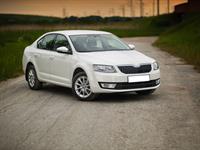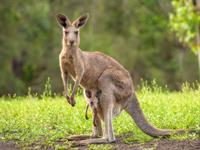PIRMĀ SEMESTRA NOSLĒGUMA TESTI
Study about the definite article.
Mācies par noteikto artikulu!
Lai mācītos par noteikto artikulu, ir nepieciešams atkārtot 2.klasē mācīto vielu par tēmu "Nenoteiktais A un AN un noteiktais artikuls THE"!
Artikuls ir palīgvārds, ko lieto pirms lietvārdiem angļu valodā. Latviešu valodā artikula nav.
NOTEIKTO ARTIKULU "THE" – [ði], [ðə] – lieto:
- ja lietvārds ir jau iepriekš minēts vai zināms.
Peter has got a new car. The car is very expensive. – Pēterim ir jauna mašīna. Šī mašīna ir ļoti dārga.

- ja runātājs min kādu konkrētu, viņam zināmu objektu vai teritoriju.
She is in the garden.
The cat is in the living room.

- ja sekojošais lietvārds vienskaitlī apzīmē visu grupu, bet, ja ir daudzskaitlī, tad artikulu nelieto.
The kangaroo lives only in Australia.
Kangaroos live only in Australia.

- pirms lietvārdiem, kas apzīmē lietas, kuras ir vienīgās. Tie ir: the sun, the sky, the grass, the moon, the world, the ground, the earth.
The sun is shining in the sky.

- pirms īpašības vārda vispārākajā pakāpē un vārdiem: the same (tas pats), the right (pareizs, īsts), the wrong (nepareizs), the following (nākamais).
This is the same number I gave you.
Giraffes are the tallest animals.


- pirms kārtas skaitļa vārdiem.
November is the eleventh month of the year.

- pirms upju, jūru, okeānu nosaukumiem.
I swam in the Atlantic Ocean last summer.
Latvians can spend their summer at the Baltic Sea.
The longest river in Latvia is the Gauja.

- pirms mūzikas instrumentiem.
My friend plays the piano.

- pirms tautību nosaukumiem.
The Latvians live in Latvia.

- pirms debespušu un vēju nosaukumiem: the south dienvidi, the north , the west, the east.
The west wind brings rain.
The sun sets in the west.

- pirms sekojošiem vārdiem, kas apzīmē sistēmu vai servisu: the police, the army, the fire brigade, the hospital.
This situation is too dangerous. Let's call the police.

- pirms uzvārdiem daudzskaitlī, apzīmējot visu ģimeni.
The Browns have a vacation in July.

- atsevišķos izteicienos.
Tell me the time, please.
What's the time?
in the morning, in the afternoon, in the evening
in the daytime
in the country
on the right / left
go to the cinema / theatre
listen to the radio
Noteikto artikulu “THE” lieto | Piemērs |
| 1. ja lietvārds ir jau iepriekš minēts vai zināms. | Andrew has got a new car. The car is quite expensive. |
| 2. ja runātājs min kādu konkrētu, viņam zināmu objektu vai teritoriju. | The dog is in the garden now. |
3. ja sekojošais lietvārds vienskaitlī apzīmē visu grupu, bet, ja ir daudzskaitlī, tad artikulu “the” nelieto. | The kangaroo lives only in Australia. Kangaroos live only in Australia. |
| 4. pirms lietvārdiem, kas apzīmē lietas, kuras ir vienīgās: the sun, the sky, the grass, the moon, the world, the ground, the earth. | The sun is shining in the sky. |
5. pirms īpašības vārdiem vispārākajā pakāpē un vārdiem: the same, the right, the wrong, the following. | Emma is the shortest in our family. My grandma called the wrong number. |
| 6. pirms kārtas skaitļa vārdiem. | April is the fourth month of the year. |
| 7. pirms upju, jūru un okeānu nosaukumiem. | Kate swam in the Atlantic Ocean. The longest river in Latvia is the Gauja. |
| 8. pirms mūzikas instrumentiem. | My sister can play the violin. |
| 9. pirms tautību nosaukumiem. | The Latvians live in Latvia. |
| 10. pirms debespušu un vēju nosaukumiem. | The sun rises in the east. The west wind brings rain. |
11. pirms sekojošiem vārdiem, kas apzīmē sistēmu vai servisu: the police, the army, the fire brigade, the hospital. | Her cousin works at the hospital. |
| 12. pirms uzvārdiem daudzskaitlī, apzīmējot visu ģimeni. | The Browns are a very happy family. |
13. atsevišķos izteicienos.
|
|